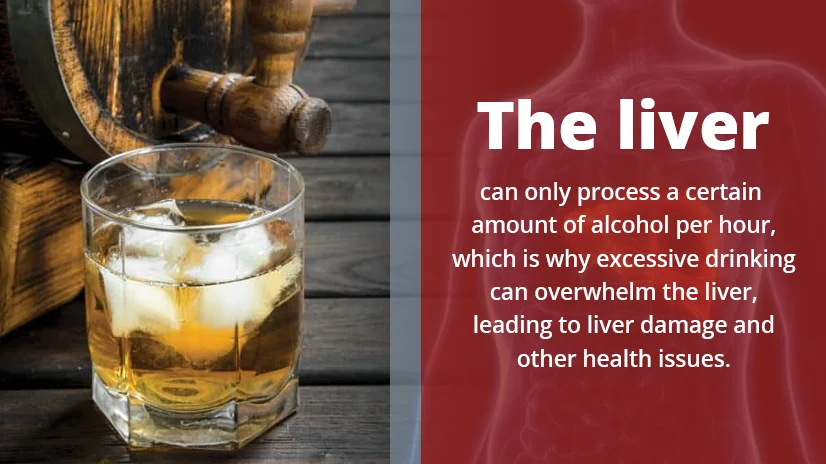
How to Detox from Opiates: Overview of Treatment
Learn how to detox from opiates with the treatment experts at Indiana Center for Recovery.

Detoxing the liver from alcohol is a critical step in recovering from alcohol abuse. The liver, a vital organ responsible for filtering toxins from the body, can be severely affected by excessive alcohol consumption. But how long does it take to detox the liver from alcohol?
In this blog, we’ll explore the process of detoxifying your liver from alcohol, how long it typically takes, and the steps you can take to support your liver during this important recovery journey.
Alcohol detox is the process of eliminating alcohol from the body and managing withdrawal symptoms that occur when someone stops drinking. Here’s what you need to know:
Contact Indiana Center for Recovery at (855) 563-0391 for more information and recovery assistance for a healthier and brighter future.

The liver plays a central part in breaking down alcohol in the body. When we drink, the liver metabolizes alcohol, converting it into acetaldehyde, a toxic compound. Enzymes in the liver then convert acetaldehyde into acetate, further broken down into carbon dioxide and water, which are eliminated from the body.
The liver can only process a certain amount of alcohol per hour, which is why excessive drinking can overwhelm the liver, leading to liver damage and other health issues. It’s important to drink responsibly to protect your liver and overall health.
Detoxifying the liver from alcohol can vary in duration depending on several factors. Generally, the liver can process about one standard drink per hour. For moderate drinkers, it might take a few days to a week for the liver to completely rid the body of alcohol. However, for heavy drinkers, the process can take much longer.
The timeframe for alcohol detoxification can vary widely. For moderate drinkers, the liver can typically detox from alcohol within a few days to a week. However, for heavy drinkers or those with liver conditions, it can take much longer, sometimes several weeks or even months.
It’s important to note that detoxification is just the first step in recovering from alcohol misuse. It’s vital to seek medical advice and support to manage withdrawal symptoms safely and effectively. Alcohol detoxification is a complex process that should be done under medical supervision to ensure the best outcomes for health and recovery.
Detoxification is a crucial first step in the journey to recovery from substance abuse. It involves three main phases: initial reaction and abstinence, detoxification and withdrawal, and post-detoxification and recovery.
During this phase, individuals may experience a range of physical and psychological indications as their body adjusts to the absence of the substance. Common symptoms include cravings, irritability, anxiety, and nausea.
It’s essential to have a supportive environment and access to medical care during this phase to ensure safety and comfort.
This phase is marked by the body’s removing the substance and adjusting to its absence. Withdrawal signs can vary widely depending on the substance and the individual’s health and history of use.
During this phase, medical supervision and support are crucial to manage symptoms and prevent complications. Medications and therapies may be used to ease withdrawal symptoms and support the detoxification process.
After completing detoxification, individuals enter the post-detoxification phase, where the focus shifts to long-term recovery. This phase may involve therapy, counseling, support groups, and lifestyle changes to manage the underlying causes of substance use and develop coping strategies for the future.
It’s a critical time for building a strong foundation for continued sobriety and overall well-being.
Liver detoxification from alcohol is crucial for recovery. Effective methods include abstaining from alcohol, which allows the liver to repair itself. Consuming foods rich in antioxidants, like fresh fruits and vegetables, helps neutralize toxins. Herbal supplements, like milk thistle, can aid in liver regeneration.
A healthy diet is crucial for liver detoxification from alcohol. Incorporating foods rich in antioxidants, such as vegetables, fruits, and whole grains, can help reduce oxidative stress and promote liver health. Avoiding processed foods and excessive sugar and fat intake is also important.
Instead, focus on lean proteins and healthy fats like those found in fish, nuts, and seeds.
Regular physical exercise plays an imperative role in liver detoxification. Exercise helps burn excess fat, which can accumulate in the liver due to alcohol consumption. It also grows blood flow, which aids in the removal of toxins from the liver.
Most days of the week, aim for at least thirty minutes of reasonable exercise, such as brisk walking, cycling, or swimming.
Hydration is essential for liver detoxification. Drinking sufficient water helps flush toxins from the body, including those that accumulate in the liver due to alcohol consumption. The goal is to drink at least eight glasses of water every day and consider adding lemon or lime juice to your water for added detoxification benefits.
Avoid sugary drinks and excessive caffeine, as they can dehydrate the body and hinder the detoxification process.
Liver detoxification is crucial for maintaining overall health. Medical treatments can help support the liver’s detoxification processes, especially in severe liver damage or toxin overload cases.
Medication-assisted detox is a treatment method that uses medicines to aid in managing withdrawal indications and cravings during the detoxification process. This approach is often used for individuals with severe substance use disorders, such as alcohol or opioid dependence.
Medications like methadone, buprenorphine, or naltrexone may be prescribed to ease withdrawal symptoms and reduce the risk of relapse.
Therapeutic apheresis is a medical procedure that involves removing harmful substances from the blood. Blood is drawn from the patient during the procedure and processed through a machine, separating harmful substances.
The cleansed blood is then returned to the body. Therapeutic apheresis can remove toxins, excess antibodies, or other harmful substances from the blood, supporting the liver and other organs in detoxification.
These medical treatments can be crucial in supporting liver detoxification and overall health. However, it’s important to consult with a healthcare professional before undergoing any detoxification treatment to ensure it’s safe and suitable for your health requirements.
When alcohol is consumed, it’s broken down by the liver. However, excessive alcohol intake can overwhelm the liver, leading to serious health consequences. One of the primary risks is alcohol-related liver disease (ARLD), which encompasses a range of conditions affecting the liver.
ARLD can manifest in several forms, including fatty liver disease, alcoholic hepatitis, and cirrhosis. Fatty liver disease happens when fat builds up in the liver, impairing its function. Alcoholic hepatitis is irritation of the liver caused by excessive alcohol consumption. If left untreated, it can develop into cirrhosis.
Cirrhosis is a late stage of scarring of the liver caused by many methods of liver illnesses and conditions, such as hepatitis and chronic alcoholism. Each time your liver is hurt, it tries to repair itself. In the process, scar tissue forms. As cirrhosis progresses, more and more scar tissue forms, making it tough for the liver to function.
Apart from ARLD, alcohol abuse can lead to various serious health risks, including an increased risk of developing liver cancer, pancreatitis, and a weakened immune system. It can also impact the brain, leading to cognitive impairments and mental health issues.
Alcohol abstinence plays a crucial role in maintaining liver health. When alcohol is taken, it is processed by the liver, leading to the production of harmful byproducts. Chronic alcohol consumption can cause inflammation and damage to liver cells, leading to conditions like fatty liver disease, alcoholic hepatitis, and cirrhosis.
Alcohol abstinence is essential for liver recovery, especially for individuals with alcohol-related liver disease. When alcohol consumption stops, the liver can begin to heal. The liver has remarkable regenerative capabilities, and with the cessation of alcohol intake, damaged liver cells can repair and regenerate, reducing the risk of further liver damage and improving overall liver function.
Achieving and maintaining alcohol abstinence is key to liver health. It requires commitment and support. Strategies for achieving and maintaining abstinence include setting clear goals, seeking support from healthcare professionals or support groups, identifying triggers and developing coping mechanisms, and making lifestyle changes to reduce the risk of relapse.
To know if your liver is detoxing, look for signs like improved digestion, clearer skin, and increased energy. However, for those with alcohol use disorder, detox processes might be more complex, often requiring professional help to manage severe withdrawal symptoms.
Regular exercise, a healthy lifestyle, and avoiding binge drinking can support the liver’s ability to recover from alcohol-related liver damage. Seek guidance from doctors or medical professionals and consider treatment facilities for alcohol addiction.
A liver cleanse typically lasts for about 1 to 3 weeks. It aims to support the liver’s ability to detoxify the body, particularly after periods of heavy alcohol consumption. Symptoms of alcohol withdrawal, including alcohol withdrawal syndrome and alcoholic fatty liver disease, may necessitate longer cleanses to restore liver function and alleviate associated discomfort fully.
Always consult a healthcare provider for personalized advice.
To reverse liver damage from alcohol, the most effective approach is to stop drinking alcohol completely. The liver has the extraordinary ability to regenerate, but this process requires time and abstinence.
A healthy diet, weight management, and regular exercise can also support liver health. In severe cases, medical intervention and treatment may be necessary.
Take the courageous step towards a life free from alcohol addiction with Indiana Center for Recovery.
Our comprehensive programs encompass detoxification, residential, and outpatient treatments tailored to meet your unique needs and support your journey to sobriety.
In addition, our Cognitive Behavioral Therapy approach helps you understand and change your thoughts and behaviors towards alcohol, empowering you to make lasting changes.
Contact us at (855) 563-0391 today to rediscover the joy of living without alcohol.